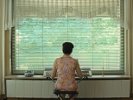Eye For Film >> Movies >> Paradise: Faith (2012) Film Review
If Ulrich Seidl’s Paradise: Love (2012) became more claustrophobic as it progressed, its follow-up, Paradise: Faith (Paradies: Glaube) promises from its outset to be a much more concentrated film, both spatially and narratively (and, perhaps, thematically). In its opening scene, Anna Maria (Maria Hofsätter) kneels before an icon of Jesus that hangs on her bedroom wall and apologises on behalf of society for its sins. She then flagellates herself for an absurd length of time.
If the first film in Seidl’s Paradise trilogy could be interpreted as an update on the fate of one of the Viennese women first seen in his 1999 film Models, he and co-scriptwriter Veronika Franz return here to territory first surveyed in the director’s 2003 film Jesus, You Know, in which various people appealed to the Son of God for some levity in their dreary lives. Whereas there were regular hints in that film on how the material contradictions of everyday life conditioned people’s faith in the first place, however, Paradise: Faith for the large part withholds such information, unfolding overwhelmingly as a chamber piece restricted to the interiors of its central character’s drab home (whose kitchen is overseen, for instance, by a framed picture of a benevolent-looking Pope Benedict).

Matching their protagonist’s unflinching routine, Seidl and Franz establish a rhythm through repetition. Anna Maria spends her evenings and spare days outside of her work as a radiologist knocking on the doors of strangers like some travelling saleswoman with only ideological doctrine to offer. She is devoted to the rehabilitation of Catholicism into Austrian society; her prayer group, which she rotationally hosts, refer to themselves as “the church’s assault group”. A compulsive cleaner, she scrubs herself clean following an encounter with a group of people having sex beyond the bushes of a park.
Presented as if Seidl himself happened upon an unsimulated orgy during a location scout, this latter scene, in particular, appears like some cruel contrivance designed to push its protagonist to the edge (it would traumatise most people, regardless of their religious beliefs). Not to make too much of a scene that ends as quickly as it’s begun, but this brief moment in the film seems to hint at larger concerns: shot like a making- of featurette on the amateur porn industry (multiple men, fewer women), it might be seen, in retrospect at least, as a primer on wider patriarchal currents.
For the biggest test Anna Maria faces in Paradise: Faith is the presence of her Muslim husband Nabil (Nabil Saleh), who returns following an accident that has left him paraplegic. Consider this pitch for a moment: a staunch Catholic woman pitted against a wheelchair-using Muslim man within not only the physical limitations of a two- storey house but also the social expectations of marital consummation. Serving his dishes straight, Seidl draws absurdity and hilarity from a narrative arrangement that is predictably and increasingly caustic. Religious intolerance and monotheistic exclusivity are neither original nor compelling themes in this day and age.
But perhaps this is missing the point. As Nabil grows increasingly confrontational in his expectations of Anna Maria to provide him with the physical needs dictated by marriage, the film might view her faith as the last means of resistance against an inherently male-oriented institution. Put another way, it might be marriage that is under attack here, not the easier target of religion. Faith too is worn down, however, because as in Jesus, You Know, Jesus is an inanimate icon in whom one invests time and energy without a guaranteed reciprocation (hence “faith”); His subsequent silence helps reinforce the patriarchal order.
Reviewed on: 03 May 2013

















